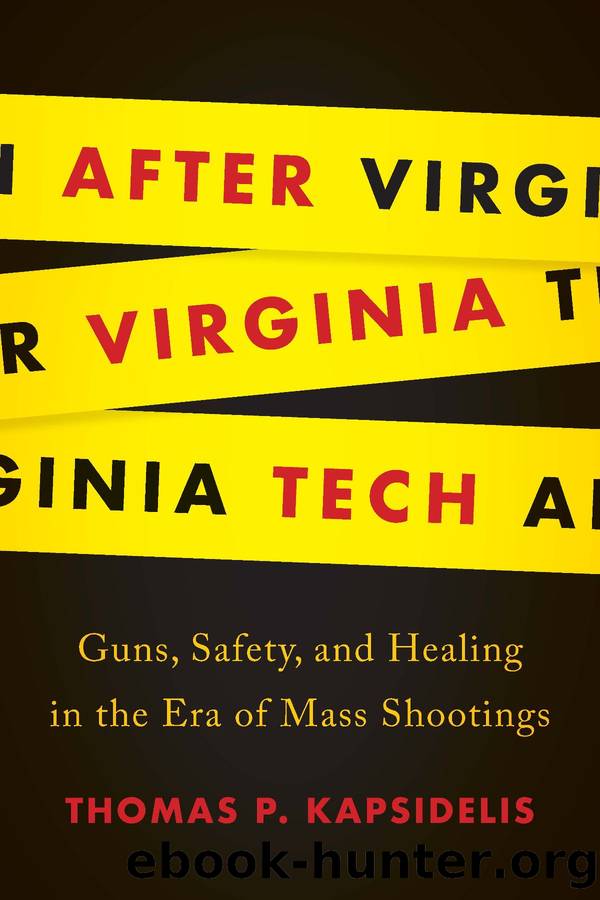After Virginia Tech: Guns, Safety, and Healing in the Era of Mass Shootings by Thomas P. Kapsidelis

Author:Thomas P. Kapsidelis [Kapsidelis, Thomas P.]
Language: eng
Format: epub
Tags: History & Theory, United States, Political Science, State & Local, South (AL; AR; FL; GA; KY; LA; MS; NC; SC; TN; VA; WV), History
ISBN: 9780813942230
Google: 9TN6DwAAQBAJ
Goodreads: 42506956
Publisher: University of Virginia Press
Published: 2019-04-16T00:00:00+00:00
On a cool autumn Friday in 2016 at Virginia Techâs health center, students who wanted to get a jump on the day waited outside until the doors opened to the clinic near the football stadium. The complex houses the physical health clinic and the Cook Counseling Center, and is next to one of Techâs recreational gyms. For those who buy into the concept of a healthy body and mind, the location seems to be a good one. On this morning there was a buzz of activity around the areaâa soccer game was to be played later in the day, and the football team was due back after a come-from-behind victory over Pitt the night before.
The counseling center was the subject of intense scrutiny in the aftermath of the Tech killings. After Choâs encounter with the state mental health systemâhis appearance in a commitment hearing that resulted in an order for involuntary outpatient treatmentâhe was triaged by Cook in 2005 but never returned for counseling. More than two years after the shootings came the disclosure that missing Cho records were taken home by the former Cook Counseling director when he left the job in 2006. Cho was triaged three times at Cookâtwice by phone and once in person after his commitment hearing. âIt was the policy of the Cook Counseling Center to allow patients to decide whether to make a follow-up appointment,â the governorâs report said. âNone was ever scheduled by Cho. Because Cook Counseling Center had accepted Cho as a voluntary patient, no notice was given to the [Community Service Board], the court, St. Albans [psychiatric treatment center in Montgomery County] or Virginia Tech officials that Cho never returned to Cook Counseling Center.â
Reinhard saw the facts unfold in Richmond, where he remained commissioner until 2010. Shortly after leaving that job, Reinhard accepted an offer from Tech to be associate director for psychiatry at Cook. He also consults with a community service board in southwest Virginia, sees patients in a region that struggles with opiate problems, and serves on the same state board as Hilscher. Returning to this part of Virginia was a homecoming for Reinhard, who was head of the state behavioral health systemâs nearby Catawba Hospital before taking the job of commissioner.
Reinhard said he senses the Tech community exhibits more caring and awareness, and that mental health providers are erring on the side of safety given the history of how so many agencies and people had contacts with Cho, yet were unable to stop him from going down the most destructive path. The establishment of a threat assessment team, required at all Virginia public colleges and universities after the shootings, has, in Reinhardâs view, been handled sensitively at Tech. In 2013, after the Newtown shootings, Virginia became the first state to require threat assessment teams within local school divisions.
Gene Deisinger, the threat assessment expert and former Virginia Tech deputy police chief, said a collaborative group that included connected members of the campus communityââboundary spannersââand police would have been a mechanism for recognizing the depth of Choâs troubles.
Download
This site does not store any files on its server. We only index and link to content provided by other sites. Please contact the content providers to delete copyright contents if any and email us, we'll remove relevant links or contents immediately.
The Art of Coaching Workbook by Elena Aguilar(51147)
Trainspotting by Irvine Welsh(21624)
Twilight of the Idols With the Antichrist and Ecce Homo by Friedrich Nietzsche(18611)
Fangirl by Rainbow Rowell(9220)
Periodization Training for Sports by Tudor Bompa(8240)
Change Your Questions, Change Your Life by Marilee Adams(7725)
This Is How You Lose Her by Junot Diaz(6866)
Asking the Right Questions: A Guide to Critical Thinking by M. Neil Browne & Stuart M. Keeley(5745)
Grit by Angela Duckworth(5588)
Red Sparrow by Jason Matthews(5460)
Paper Towns by Green John(5168)
Room 212 by Kate Stewart(5095)
Ken Follett - World without end by Ken Follett(4712)
Housekeeping by Marilynne Robinson(4429)
The Sports Rules Book by Human Kinetics(4374)
Double Down (Diary of a Wimpy Kid Book 11) by Jeff Kinney(4256)
Papillon (English) by Henri Charrière(4247)
The Motorcycle Diaries by Ernesto Che Guevara(4078)
Exercise Technique Manual for Resistance Training by National Strength & Conditioning Association(4052)
